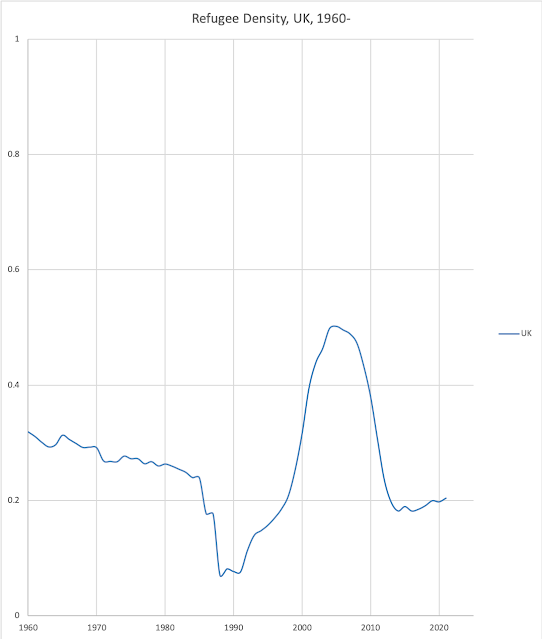The Big Lie of the "Refugee Crisis" in Britain (with a Footnote on Hungary)
There's much spotlight on the UK where Gary Lineker, a very popular former footballer and a current sports commentator, was suspended by his employer, the BBC, for having published a tweet in which he compared the British government's rhetoric regarding refugee inflows to the policies of the Third Reich. In response, the Home Secretary of the UK came out claiming that Britain "has been taken for a ride" because of the unreasonably high burden that refugee arrivals put on the country.
So, let's see some comparisons.
According to the latest publicly available data, presented by the World Bank (not known as a particularly deeply committed pro-refugee organization) in 2021, the UK received 137,078 refugee arrivals. That constituted a whopping 0.2% of the total population of the country. Let's see the recent history of this process, shall we?
Surely, Britain has seen a bit of a fluctuation in its refugee density (a simple index computed by dividing the number of refugees by the total population, expressed in percentages) since 1960. But, as the graph above shows, it would be a wild exaggeration to claim that the UK is at some kind of a historic peak in terms of refugee numbers. Or that the former colonial overlord of much of the world does not have the resources to support the refugees that do make it to British soil. In fact, with its figure around .2%, Britain's refugee density is moderate-to-low at the moment.
To understand what all this means, it might help to put things in a bit of a broader, comparative perspective. So, let's see a few comparisons, just for fun.
The first country to compare the UK to is Türkiye, which is often mentioned in social media space as a country struggling with a large number of refugee inflows, due to the numerous wars in west Asia.
Indeed, with the recent, dramatic upswing in its refugee density, Türkiye is a state struggling with a considerably greater refugee burden than the UK. Notice that, in order to be able to show Türkiye's refugee density of between 4% and 5% of its population, we had to re-scale the graph, essentially compressing Britain's line.
But, is Türkiye the an extreme example? Let's see.
As it turns out, another state in west Asia, Lebanon has a refugee burden even more extreme than Türkiye. Since 2014, Lebanon's refugee density has been hovering around 25%. Let me repeat: The number of refugees in Lebanon count for almost one-fourth of the resident population of the country.
But even Lebanon is not the country with the highest refugee density.
In 1960, Jordan's refugee population amounted to 75% of the country's native population, and never throughout the entire period since 1960 has it gone below the 25% line. At the last data point (in 2021) the refugee density of Jordan was around 27.3%. If we are to accommodate Jordan's historic numbers in our graph, the line representing the UK becomes so flat that it is virtually indistinguishable from 0.
As for the United Kingdom, I am inclined to make four, pretty depressing conclusions from all this.
1 Its government willfully overstates the magnitude of the presence of refugees in the UK.
2 It does so with malicious intent: It is very clear that the government's political purpose is incitement of anti-refugee, anti-immigration, and xenophobic emotions. Things must be looking dim for the Tories if this is how they are trying to drum up some semblance of popular support.
3 If that is so, the question emerges whether Britain is not in violation of the numerous international agreements, charters, etc., regarding human rights, specifically the human rights of victims of genocide and wars in which they--the victims--have not played any role.
4 As a matter of fact, the wars and international settlements that have generated those refugee flows have arguably been the direct results of the policies of that government and its geopolitical allies.
FOOTNOTE
Somebody has just asked me for a comparison with Hungary since at least one recent precedent to the anti-refugee, anti-migration, anti-migrant and anti-human-rights rhetoric of the current British government is Hungarian PM Orbán's violent xenophobic turn in 2015, churning out the "refugee crisis" verbiage. So, here is the comparison of the UK and Hungary, with all data available (the World Bank site where the data come from, provides no refugee information for Hungary for the period before 1989).
Again, we are back to the 0-1% scale, the world of the host countries with little to no refugee influx. Clearly, with the exception of the 1990 refugee flows (when citizens of neighboring Romania reached the inflated the level of refugee density to .7% in Hungary--still a very manageable, and I should add, well managed, magnitude), Hungary has been nowhere near even the UK, let alone the countries with truly sizable refugee densities. Orbán's alarmist rhetoric of a "crisis" is based even less on "facts" than Braverman's.
Lies, lies, and more lies. Or, perhaps it is stylistically more appropriate to call it a hoax, an intentional fraud. Or just bs.







Comments
Post a Comment